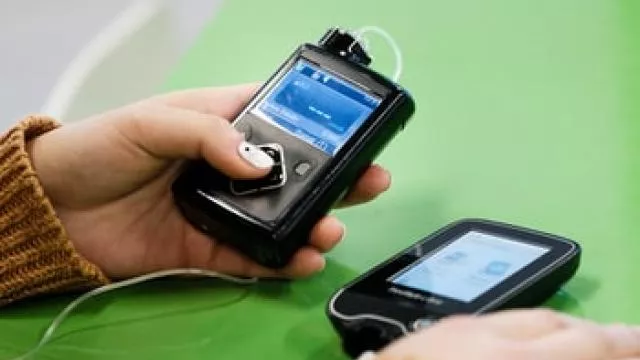
Diabetes UK Cymru is hosting the “Type 1 and Tech Conference” online on World Diabetes Day under the theme of “All Together”. The free event has attracted a global audience and focuses on current technologies and innovations for diabetes management, as well as the experiences of people living with diabetes who are using apps and devices.
Advances in technology have changed the way thousands of people manage their diabetes and can improve their quality of life. Insulin pens and pumps help people to control their condition discreetly in a more accurate and flexible way. Flash Glucose Monitoring and Continuous Glucose Monitors allow people to keep track of their blood sugar via wearable sensors, reducing the need for regular finger prick tests.
Dai Williams, Diabetes UK Cymru’s National Director said: “We believe everyone who can benefit from wearable diabetes technology should have access to it, so we are calling on Welsh Government to look at increasing the money available to fund medical technologies and end the postcode lottery on access. “At this conference, during this very difficult time, we’re urging everyone to work together towards this common goal, so people can feel more confident managing their diabetes, more in control, resulting in improved blood glucose levels and improved mental health and wellbeing. It’s crucial to empower people while there is so much uncertainty and NHS services are busy dealing with COVID-19”.
The event will also discuss how new online platforms are being used during the pandemic to bring the diabetes community together, creating new support groups and information channels. The Type 1 and Technology conference began in 2018 in partnership with the Diabetes Research Unit Cymru at Swansea University. In 2020 it will be live streamed on Zoom with attendees from around the world.
Mum and son team use clever tech to tackle type 1 diabetes

11-year old, Fin Gough from Ton Pentre, Rhondda who lives with type 1 diabetes will be at the conference to talk about his use of tech to play rugby, go on school trips and bike rides with friends, knowing that his diabetes is well under control.
Fin was diagnosed when he was two years old and has tried different technologies over the years. He is currently using a closed loop system. It combines a wearable Continuous Glucose Monitor, that communicates with a pump to deliver tiny amounts of insulin, controlled by his Android phone, acting as an Artificial Pancreas System (APS).
Fin said: “This was invented by extremely clever people. I can now play rugby, go on trips away and be out with friends. Since ’looping’ I feel much better, have less highs and lows, can keep healthy and chase my dream of playing rugby for Wales.”
Fin’s mum, Bethan can see all the data on her smart phone in real time, look at patterns and identify issues. She explained: “I feel very strongly about access and funding for technology for all children with type 1 diabetes, because currently, it can be a postcode lottery.
"We started our battle by self-funding for 3 years and then after proving the benefits, we got the tech via NHS Wales. There are families out there who haven’t got that option. For us, it’s been amazing, because we are able to sleep at night, it gives us peace of mind 24/7 and allows Fin to be more independent. All children should have this option available to them regardless of where they live." Bethan, Fin's mum
According to Diabetes UK research, in Wales:
- only 1% of people use DIY closed loop technologies.
- Almost 45% use flash glucose monitoring and Wales is the first country in the UK to offer this technology on prescription across all health boards in 2018.
- 65% of Welsh respondents who haven’t tried to access diabetes technology said that they had never been offered or suggested any form of diabetes technology.
- More than a third of those refused technology on the NHS were refused for not meeting the criteria. The same proportion of people have experienced worsened mental and emotional health as a result of not getting access to the technology they want. One in seven who were refused access to tech were because of the cost.
Type 1 diabetes is a lifelong condition that affects around 15,000 people in Wales. People with the condition don’t produce the hormone insulin, which is responsible for controlling the amount of glucose in the blood. Nobody knows what causes Type 1 diabetes and it isn’t currently preventable.
Read more about diabetes technology.
